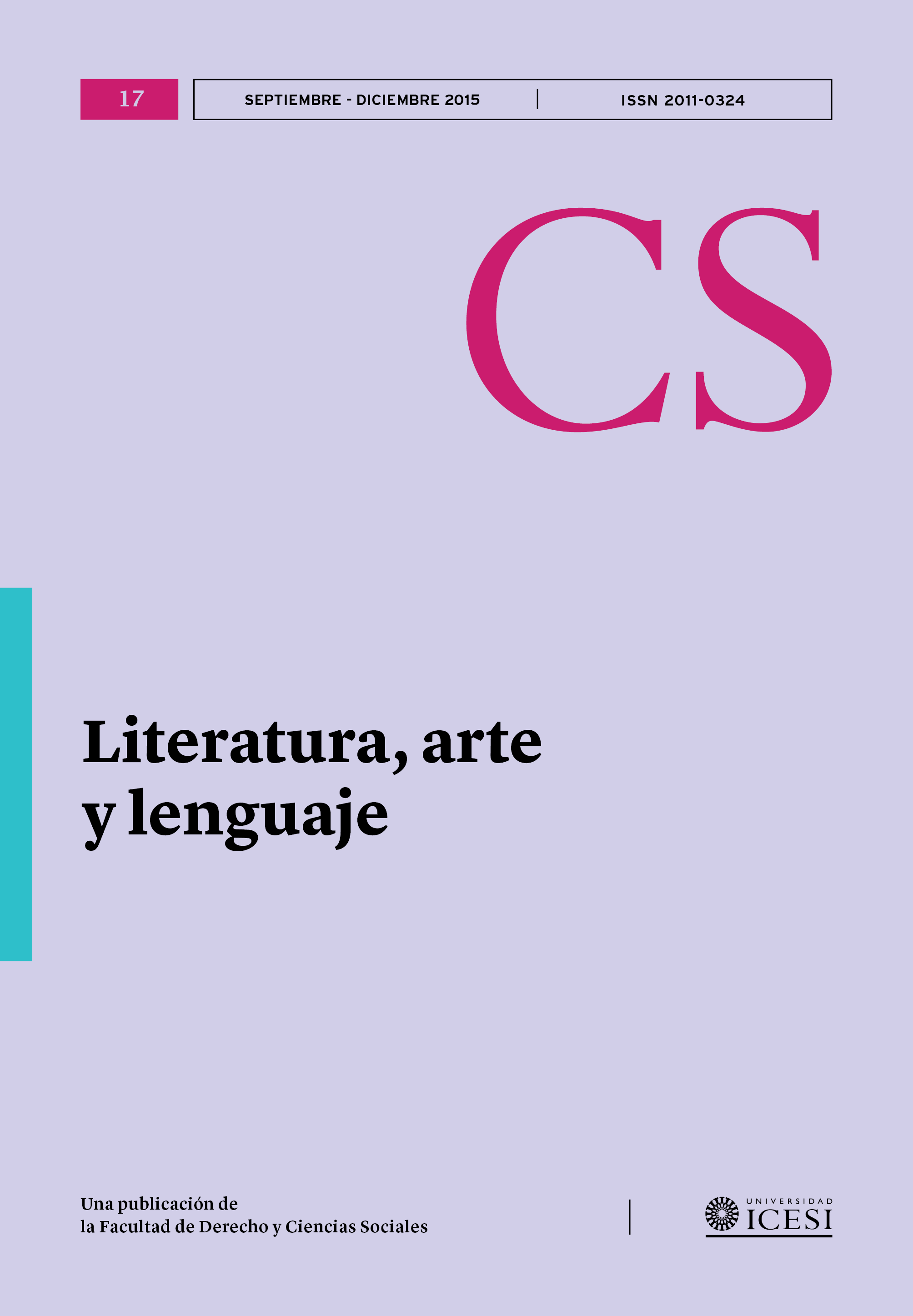I awake, she slept. Sor Juana Ines and Juan Rulfo or the new Latin American poetic condition
DOI:
https://doi.org/10.18046/recs.i17.2072Keywords:
Poetic condition, Human condition, Poetic thoughts, Poetic reason, Poetry, MetaphorAbstract
The article examines how Sor Juana Ines de la Cruz and Juan Rulfo, in dialogue with the literary tradition –especially with the work of Dante, Gongorism and the modern tradition– build a Latin American poetic condition. To that end, it studies the long oneiric ascent of Sor Juana, in First Dream; and Susana San Juan’s story, in Pedro Paramo. For the analysis, it goes to the concepts of resistance when suffering and the signals to transcendence provided by Maria Zambrano in her reflections on the essential condition of the human. It explains how Sor Juana and Susana San Juan offer such resistance: Sor Juana through the journey of knowledge, the sovereignty of the body, the exposure of the precariousness of life and the metaphor of the ascent; Susana, through the fall, madness and eroticism. Finally, it interprets in both characters, the appropriation of the signs of transcendence: the revaluation of the moment, of dreams and the creation-destruction of the divine. It concludes by showing how Sor Juana takes the momentum that starts in Europe with Montaigne, Bacon, the Renaissance and the Golden Age and proposes significant transformations that allow speaking of a different poetic condition. And how Rulfo, starting from the American mythic-religious condition, the non-place, the ontological indefiniteness, stops at the image of Purgatory: showing there the luminous consciousness, the unleashed eroticism and the sacralized madness of Susana as a relief, a possibility of leakage and human of redemption of the sentence.
Downloads
References
Alazraki, J. (1971). Jorge Luis Borges (Columbia Essays on Modern Writers). New York: Columbia.
Aristóteles-Horacio-Boileau. (1982). Poéticas. (A. G. Pérez, Ed.) Madrid.
Arroyo Hidalgo, S. (2001). Una lectura de "Primero sueño", de Sor Juana Inés de la Cruz. Universidad Nacional Autónoma de México, Humanidades. México: UNAM.
Barth, J. (Agosto de 1967). La literatura del agotamiento. The Atlantic Monthly, 220(2).
Bloom, H. (2001). El canon occidental. Barcelona: Anagrama.
Borges, J. L. (1973). Ficciones. Caracas: Ayacucho.
Borges, J. L. (1982). Nueve ensayos dantescos. Madrid: Espasa.
Borges-Sábato. (1996). Diálogos. Buenos Aires: Emecé.
Bravo, V. (1998). De padecer y la trascendencia. La filosofía poética de María Zambrano. (U. C. Madrid, Editor) Recuperado el 30 de Marzo de 2015, de Espéculo. Revista de estudios literarios: http://www.ucm.es/info/especulo/numero10/zambrano.html
Buxó, J. P. (1984). Sor Juana Inés de la Cruz en el conocimiento de su sueño. En C. d. Humanidades (Ed.), Discurso. José H. Moreno de Alba, Contestación. México: UNAM.
Campos, H. D. (S.F de s.f.). De la razón antropofágica: Europa bajo el signo de la devoración. La Torre, pp. 235-258.
Sagrada Biblia. Salmos, 139:16. (1966). (N. Colunga, Trad.) Madrid: Editorial Católica.
De Toro, A. (1992). El productor 'rizomórfico' y el lector como detective literario: la aventura de los signos o la postmodernidad del discurso borgesiano (intertextualidad-palimpsesto-rizoma-deconstrucción). En A. De Toro, & K. A. Blüher, Jorge Luis Borges: procedimientos literarios y bases epistemológicas, pp. 145-184. Frankfurt am Main: Vervuert.
De Toro, A. (1995). Postcolonialidad y postmodernidad. Jorge Luis Borges o La periferia en el centro/ la periferia como centro/ el centro de la periferia. Iberoromania (44), pp. 64-98.
De Toro, F. (2002). Intersecciones II: ensayos sobre cultura y literatura en la condición posmoderna y poscolonial. Buenos Aires: Galerna.
Delgado, H. (2002). Atributos de la poesía. Clave.
Delgado, H. (2009). Novela y metáfora,. Tensiones y extensiones. Universidad del Valle, Humanidades. Cali: Universidad del Valle.
Goic, C. (1961). Góngora y la retórica manierista de la dificultad docta. Atenea, CXLII(393), 169.
González Echavarría, R. ((1986), 16 pp.; de 1986). Borges y Derrida. Letras de Buenos Aires (16), pp. 9-21.
Gusdorf, G. (1991). Condiciones y límites de la autobiografía. Suplementos Anthropos Nº 29, pp. 9-18.
Jay, M. (2009). Cantos de experiencia.Variaciones modernas sobre un tema universal. Buenos Aires, Argentina: Paidós.
Jitrik, N. (2014). Enfoques Críticos. Algo de literatura latinoamericana en su-gestión. Pereira.
Jitrik, N. (2014). Productividad de la crítica. Lección inaugural del Doctorado en Literatura, 22. Pereira: Universidad Tecnológica de Pereira.
Lyotard, J. F. (1998). Lo inhumano. Charlas sobre el tiempo. Buenos Aires: Manantial.
Mignolo, W. (1987). Diálogo y conversación. En Diálogos hispánicos de Amsterdam. N° 6. La semiótica del diálogo. (págs. 3-26). Amsterdam, Mignolo, Walter. Amsterdam: Rodopi B.V.
Morales Ortiz, G. M. (1999). La trayectoria intelectual de Antonio Cornejo Polar. Revista de Crítica Literaria Latinoamericana(25), 187-197.
Paz, O. (1982). Sor Juana Inés de la Cruz o las trampas de la fe. Barcelona: Seix Barral.
Ricoeur, P. (2001). La metáfora viva. España: Trotta-Cristiandad.
Ross, W. (enero-marzo de 1972). Las Maha-Vidya-s y el Sueño de Sor Juana . Revista de la Universidad de Antoquia(184), 81-99.
Rulfo, J. (1988). Pedro Páramo - El llano en llamas. Madrid: Aguilar.
Sabat de Rivers, G. (s.f.). Sor Juana y su Sueño: antecedentes científicos en la poesía española del Siglo de Oro. Cuadernos Hispanoamericanos, 310, 186-204.
Valèry, P. (1998). Teoría poética y estética. Madrir: Visor.
Downloads
Published
Issue
Section
License
Copyright (c) 2015 Hoover Delgado

This work is licensed under a Creative Commons Attribution-NonCommercial 4.0 International License.
© Reserved Copyright
Material in this publication may be reproduced without authorization, provided the title, author and institutional source is acknowledged.
The content published in Revista CS is distributed under the Creative Commons BY-NC 4.0 Attribution/Recognition-NonCommercial 4.0 International license.
You are free to:
Share — copy and redistribute the material in any medium or format.
Adapt — remix, transform, and build upon the material.
Under the following terms:
Attribution — You must give appropriate credit , provide a link to the license, and indicate if changes were made . You may do so in any reasonable manner, but not in any way that suggests the licensor endorses you or your use.
NonCommercial — You may not use the material for commercial purposes.












